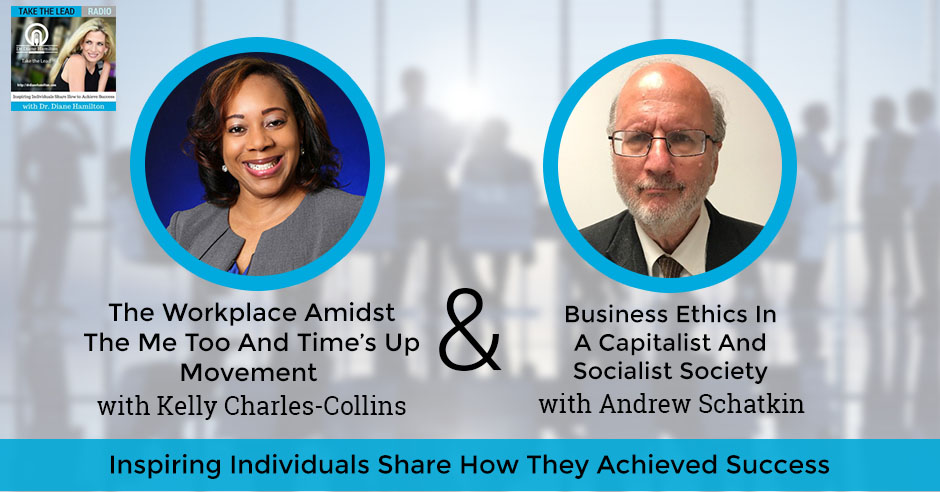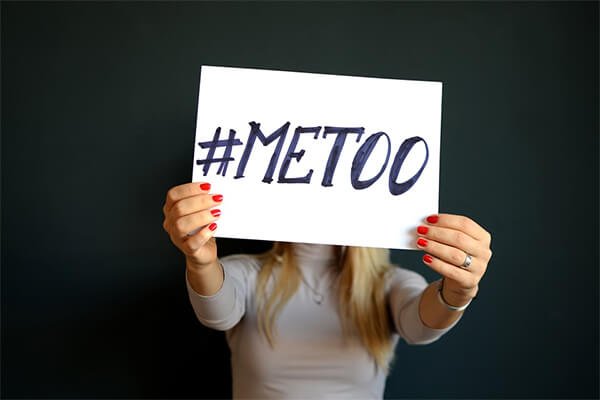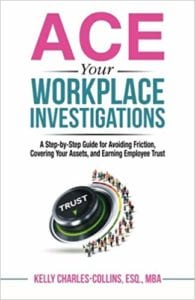
I’m so glad you joined us because we have Kelly Charles-Collins and Andrew Schatkin here. Kelly is an Employment Trial Attorney. She’s a speaker, author, HR consultant and arbitrator. She’s really up on all the latest topics that are in the legal environment, the #MeToo Movement and some of that. We’re going to talk to her about that. As we continue on with the Code of Ethics and some of the things that we’re going to discuss with Kelly, we have Andrew Schatkin who is an educational and business consultant, writer, speaker and teacher. He’s got a podcast where he deals with controversial topics that are ethics-based. I thought that they made a great complement to get into the ethics arena.
Listen to the podcast here
The Workplace Amidst The Me Too And Time’s Up Movement with Kelly Charles-Collins
I am here with Kelly Charles-Collins, who is an attorney, public speaker, author, arbitrator and HR expert. She’s worked for Fortune 100 and 500 companies, is a former business owner and founded and led a nonprofit for breast cancer awareness. She speaks at top conferences and is an expert in counseling, developing company policies, assessment and implementing workplace solutions. She also conducts workplace investigations. She’s the author of ACE Your Workplace Investigations: A Step-By-Step Guide to Avoiding Friction, Converting Your Assets, and Earning Employee Trust. It’s nice to have you here, Kelly.
Thank you so much for having me, Diane.
This is going to be fun because we know Libby Gill, we have her in common, we have Hamilton last name in common. We have a lot in common that we didn’t even know that. I think it’s really interesting to look at what you do. When I was talking to Libby about you, she said, “You need to talk to Kelly because she is so into understanding the issues with the #MeToo Movement and all the problems that organizations are experiencing right now with harassment and a lot of the issues that are just coming to a surface because of the #MeToo Movement. I hope it’s okay if we go in that direction. You have worked for more than twenty years as a trial lawyer so you’ve defended everything from small business to multibillion-dollar companies. You’ve got quite the experience and it’s very important to express that because I want to ask you about what you think is happening with the #MeToo Movement and the Time’s Up Movement and how are they impacting companies right now?
The two movements have raised awareness. This sexual harassment and sexual violence, bullying, all the things that are being raised in the #MeToo Movement and the Time’s Up Movement have been going on forever. It’s not new to the business world, it’s not new to these companies. Now that it is news, it is making everyone’s antennas go up. Do I have a Harvey Weinstein in my mix? Some companies know that they do and they have not done anything about it. By having this beyond the news and it’s constantly in the news, some of these news stories come in cycles. They come and they go and this is something that’s not going. There may be a little low and then all of the sudden we hear another one.
It’s important to know that what’s in the news are these big people that you see, the Harvey Weinsteins, the newscasters, those are the names that we see and we sometimes take comfort in knowing, “Those are big companies, that’s not my company.” What we have to be very mindful of is that these things happen every day and all companies, whether it’s a small business, it’s a restaurant, it’s a hotel, it’s a multibillion-dollar company, it happens across the board. I think there’s awareness and just really having people’s antennas up that has happened as a result of the #MeToo and Time’s Up Movements.
Was there anyone who really surprised you who was famous that you just went, “I wouldn’t have called that.” She just caught you off guard or you so used to this that you’re like, “I’m pretty much expecting that.”
I wasn’t caught off guard. I think when you look at some of the men who got away with a lot of these things or some of them are still alleged charges but when you see it, you look at, “What is the business case for why they’re still there?” These are top performers who are in these businesses. Sometimes these companies look the other way because they’re bringing in money. Bottom line versus, “We can sweep that under the rug. If they hadn’t made a big stink about it yet, they’re probably not going to make a big stink about it. They’ve complained, they haven’t done anything about it. Nothing’s really happened. We can move on and keep doing business as usual.” What’s coming to light is just that. That this is what’s happening in these companies. It’s not everywhere, not everyone does that but that there is this type of culture in some businesses that the top producer, moneymaker, are more important than what’s happening with the other people in the business.
There’s just this blatancy to me. I’ve seen so many people and I am just as guilty as other women out there who didn’t report things because some people are just so blatant and you just figure, “He’s doing this to everybody and I don’t want to be the one to say it.” It surprises me how much they put in writing. I am thinking, “Are you really that stupid?” That’s all I could think of when I see some of the stuff that some of these guys write and I am sure it’s not just men. It’s everybody who is doing this type of thing. What are they thinking? Do they not know that it’s wrong? Do they just think, “Who cares? I’m better than this. I’m entitled.” What do you think is behind it?

Harassers can be women, they could be men and it can be same-sex harassment. It doesn’t have to be male or female. Some of it is stupidity but a lot of it is arrogance. Thinking that they have the power, they have the air of the people who would make some type of change or have anything to do with correcting the behavior. There’s an arrogance that goes along with it. I also tell people that sometimes when you have someone who’s not as powerful as a Harvey Weinstein, so you just have a regular supervisor, a mid-level manager or a low-level manager, sometimes it’s ignorance of what they’re doing is against the law. For example, I had to train this gentleman and he has a Hispanic background. People were complaining that he was harassing them and he was doing all these things.
He and I sat down together for four hours so that I could really explain to him about sexual harassment, about Title VII, about what the laws are. What came out of that was for him it was a cultural misunderstanding because for him he was just being a ladies’ man, “Ladies loves me. They like me. This one likes me. It doesn’t matter that I’m married. I’m just hanging out. What’s the problem?” A lot of it has to do with making people aware of what is happening and the things that you may do outside of work and in your personal life, you cannot bring to work. You cannot try to use it to entice someone to do something so that you’ll give them something for it or use it as what we call a quid pro quo, this for that, to then take away something from them. Some of it is arrogance, some of it is stupidity and some is ignorance.
I just figured some of these guys, they must throw it out as much as they can up against the wall and see something’s going to happen because I’m thinking, “Who wants to be talked to like that? What kind of women like this?” It surprises me to begin with that these guys actually get something out of acting like an idiot sometimes. I’m wondering how they’re getting rewarded for some of this behavior. Who’s letting them get away with it? Not the ones they’re having their jobs held over their heads and things like that, but just in general. It just happens so much in the workplace that these guys just keep acting like that.
I don’t think anyone likes it. A lot of it is fear. When I listened to the stories that come out of the #MeToo Movement, the Time’s Up Movement, the things that strike me are one, they don’t report because they’re fearful. Two, that reporting is futile. Nothing’s going to happen so why report anyway. When you’re thinking about people in the restaurant industry, the hotel industry or just any job that is not somebody making six figures or seven figures, they’re thinking about their day-to-day wellbeing. “If I go and complain, do I lose my job or does that person lose their job? If I lose my job, what does that do for my family? Then do I just suck it up and keep going every day and know that I’m coming to work and this person’s going to harass me and I may have to give in to some of this stuff because the alternative is reporting to someone that I believe will not do anything about it? If they do something about it, is it going to be against me as opposed to the harasser?” Nobody wants to get harassed. It is this uncomfortable dance and balance of wanting to speak up, hoping that you can speak up and self-preservation.
I’ve worked for a company. I remember thinking that there was a lot of crazy stuff going on and then I found out there was a lawsuit within HR harassing each other. You go to them, they’re doing it to each other. It’s very challenging. I don’t really know exactly how much does this costs these people who are actually being taken to court over this. Are they getting away with it? What’s the consequence to them?
These cases cost a lot of money and that’s what I try to tell people all the time. When you have a claim of sexual harassment, for example, if Mary is sexually harassed by Joe, Joe doesn’t get sued. The company gets sued because there’s no personal liability for sexual harassment. The company is sued vicariously for Joe’s bad behavior. In order to file a lawsuit based on sexual harassment, you have to go through the administrative process and that means filing a claim with the Equal Employment Opportunity Commission or a state agency. When the employee goes to do that, it doesn’t cost them any money, they can just go, they can call, they can go to the office or they can start the process online. It costs them no money. Then once that’s accepted by the EOC, the company will get a notice that a charge of discrimination has been filed against them.
[bctt tweet=”Businesses who ignore sexual harassment in the workplace fall in any of the three: arrogance, stupidity, or ignorance.” via=”no”]It costs you immediately. If you are being mindful, you will get counsel so that you make sure that you answer the charge properly. Even if you don’t, that process that you have to now go through to answer the charge of discrimination, to find information, to talk to people, to gather documents so that you can respond, that takes time away from your business, away from the business of whatever your business is. There are all these costs to it. Then you have soft costs, you have people asking, “What’s going on? What’s happening? Who complained about that? They’re being sued.” There’s all of this that’s going on. Your reputation, your goodwill, all of that stuff happens and so it costs immediately.
The other thing is that once a lawsuit is filed, when a corporation is sued in Florida, they can’t represent themselves, so they have to have an attorney and I think in most places they probably do have to be represented by counsel. Now, you have to engage counsel. The employee, even if they engage council, a lot of those are taken on a contingency so they may end up paying upfront the filing fee which may be a few hundred dollars. They’re still not coming out of pocket, but here you are coming out of pocket and then most of these cases settle. At some point they settle, well over 90% of these cases settle. Whether they settle at the charge stage, whether they settled when the lawsuit is filed, in the middle of it or at some point, they settle. You have to pay money to the settlement. You’re paying your attorney, pay for the settlement and if the employee has an attorney, part of what you’re paying is their attorney’s fees.
There are all these fees. Let’s say I had a boss that was saying all these inappropriate things to me through text or email that didn’t keep me from getting a job but I found it offensive. I had contacted the EOC. How frivolous is that compared to somebody who didn’t get a job because of it? What do they determine is worthy of being enough to be a problem?
It has to be an adverse action, which under the law means certain things, so it has to affect the terms and conditions of your employment. For example, being demoted, being fired, and not being promoted, those types of things they look at to see if there was really some type of action. The other thing with sexual harassment is that it has to be severe or pervasive, so it has to be bad enough or it has to have gone on for long enough. That’s where a lot of these cases fail because it may just be one breast grab or one butt grab. While that is truly offensive, it may not rise to the level of sexual harassment. It should be a violation of a company policy so they shouldn’t get away with it anyway. If we’re just talking about legally what sexual harassment is, a lot of those claims fall on those two things.

Say somebody like in my situation file that claims, they still have to get a lawyer.
In the beginning, they don’t. The employee never has to get a lawyer. The employee can do this case themselves. I wouldn’t recommend it, but they can do the case themselves. They’ll go through the EOC and the EOC, the investigators will talk to them and then they’ll figure out whether or not there’s enough.
It is an interesting thing. I don’t know if you watch Criminal Minds, which is a television show. It’s actually a pretty good show, but there was a byline of the characters on the show, which I found really strange that they had on the show, even though I still watch the show and still like it. They work together. They had this really intensely flirtatious, constant banter back and forth where he called her baby girl and she would say, “Anything for you, baby.” They’re almost like promoting it’s okay to do that in the workplace.
I noticed all of a sudden in one episode they had this sexual discrimination episode about how we’re not supposed to do this. I’m wondering if they got in trouble for that on the show because I think that there’s a lot that you don’t think of as harmful but then I think that they probably were not making a very good point by having it be that on the show. I just think that there’s a lot to this that people don’t understand and some people will take offense to something that for somebody else is just no big deal so you don’t know. I think a lot of people are gun shy. They don’t know what they can say or what they can do, do you think?
I think that’s one of the things that has happened too is that people are like, “I can’t do this and now I can’t do that.” I think we just have to use common sense. If you would not like somebody to do that to your mother, father, sister, brother, cousin, then why would you do it to someone else? What you just said was really interesting because it may be offensive to somebody. Somebody who’s even hearing it may not be offensive to the person who it’s being said to or being done to. That person who hears it or sees it, they could file a claim. It is really this hodgepodge of, “What can I do?”
[bctt tweet=”Sexual harassment in the workplace is this uncomfortable dance of wanting to speak up.” via=”no”]That’s where training comes in to really explain to people about what could be considered offensive conduct? What is considered offensive conduct under the law? What does that look like? What happens? People don’t think of it if I’m asking you out on a date. We have all these different generations in our workplace right now. I have a Millennial son. They are on Facebook, on Twitter, everyone communicates differently and they all said that they like to hang out together and they like to go do all these things together. Managers, subordinates, everybody and they don’t think of it in the way that, “I’m being sexually harassed,” or when we’re out on the weekend, that is still my supervisor. A lot of it is just being trained to understand what it is so that you can recognize it when it’s happening or recognize it when you’re doing it.
What do you consider a hostile workplace?
I’m a lawyer and that depends. A hostile work environment, it’s the same thing, it has to be severe and/or pervasive and it has to affect the terms and conditions of your employment. For example, a hostile work environment could be racial, it could be based on sex, just not sexual so gender, it could be a disability, it could be sexual orientation. It is one of the versions of it. There’s hostile work environment, there’s quid pro quo that could be sexual harassment if it’s based on a sexual connotation, but it has to be based on a protected category. It has to be severe or it has to be pervasive.
What if you’re working for Steve Jobs in the day when he was just being a jerk to you, is that a pretty hostile work environment?
It could be, but it depends on whether he’s an equal opportunity jerk. This is what I always tell my clients. The thing to always think about is even if it’s not sexual harassment, even if it’s not a hostile work environment, it is something because you have workplace misconduct policies. That could be that you’re being a bully, it could be that you’re just being offensive, it could be a number of other things so it’s not to just focus on if it’s a “hostile work environment.”
All this led you to want to write this book. Tell me a little bit about your book.

My book is ACE Your Workplace Investigations and I wanted to really put into layman’s terms how to conduct these workplace investigations effectively, but also really to reframe the discussion around workplace investigations. I put in the book that HR professionals would probably rather watch paint dry or I tell people to choke on a grape than do one of these investigations because they think of it from the burden perspective, “It costs time, it costs money, I don’t want to deal with this.” What I want is to help the business owners, HR professionals to really rethink that and think about the benefits of conducting these investigations.
What can you get out of it? There are lots of things happening in businesses that HR upper-level management have no clue is going on. When you have this investigation, use it as a way to really understand what is bubbling beneath the surface. When these employees come and complain, by the time you talked to all the other witnesses, you will learn about so many other things that are happening. One of the other benefits is that it helps you to intervene early in those situations. Go take care of those situations. Deter the behavior. Stop the behavior from happening. Look at it that way. If you conduct these investigations properly, then it will help you to earn your employees trust.
Employees hate HR. They think HR works for the company. It has nothing to do with them, it doesn’t have their best interests at heart. That’s why for the subtitle I said, “Earn employee trust,” because if you start to earn that trust, they’ll report more, they’ll tell you what’s going on and really it will reduce the need for them to be reporting because there won’t be anything to report. If you get these people out of there, if you handle these issues, if you take care of these problems, then you are really encouraging a safe and inclusive workplace where people feel that they’re being respected, that they mean something, that they’re part of the team and they’ll work hard for you.
I teach a lot of HR courses and HR courses are actually some of the most fun courses to teach. You forget that they have all the fun things to do because they have this horrible stuff to do. HR is actually such a great area of business and I think they do so many important things. I’m glad we’re talking about some of this because I think so many people do look at HR as the Toby character from The Office or they say, “This guy with the manual that’s going to make all these horrible things.” They protect you. They do all the great things. This is such an important information. I could see why your book is so successful and why you’re what you’re doing to help everybody out there.
It’s unfortunate that it’s come to a situation that there are so many people burying their heads for so long and it’s not like you don’t want to have fun at work. A lot of people are walking on eggshells to some extent, but we were going to have to find some balance where you can still have fun and not torture everybody. That’s what I’d like to see. I think that a lot of people could benefit from learning more about what you’re doing and I was wondering if you would share your website and how they can find your book and all that.
My website is www.KellyCharlesCollins.com. The book will be on sale on Amazon and you can also get to the book through my website.
This has been so interesting, Kelly. Thank you so much for being on my show.
Thank you so much for having me. I really enjoyed it.
This is such a timely topic and it’s just been really wonderful.
Business Ethics In A Capitalist And Socialist Society with Andrew Schatkin
I am here with Andrew Schatkin who is a business and educational consultant, writer, speaker and teacher. He has published multiple books regarding general philosophical essays. His books have been pushed by major international universities in Cairo, Egypt, Hong Kong, China, and Germany, as well as top universities in the US including Harvard and Columbia and many others. He is listed in the Who’s Who in America and Who’s Who in The World and was approved for the William Fulbright Scholarship Award. He’s the host of The Andrew Schatkin Show. It’s so nice to have you here, Andrew.
Diane, it’s a real pleasure to be here. I’m always happy to have a lively, entertaining conversation so to speak. I’m extremely flattered and happy that you gave me a chance to say a few words.
This will be interesting. We were both at Harrison’s Publicity Summit in New York. You have your show that you deal with, a little bit different topic than what we deal with here. This show is based on leadership and success. I thought that because you deal with so many controversial topics and things that you might be a really great person to talk to about ethics in business because there are so many unethical issues going around right now with top companies out there. Even if we don’t have to go into the specifics of each company, there are companies that you would normally think of is the top-tier companies having very serious unethical issues in the news. I know you deal with a lot of legal issues. People on your show are international law experts, are you seeing more unethical issues? Are you having more shows that deal with those things that are in the US or are you seeing it more worldwide or is this just something that everybody is just going around the world?
This is a question that is really difficult to answer because it depends on your point of view, how you perceive events. I know that you’ve heard of Noam Chomsky. He’s written a number of books, he’s speaking somewhat to the left, which is fine. He wrote a book called Profit Over People and I think that’s the issue. I don’t want to say that I’m engaging in political hype or attacks, but he defined the issues that you just defined about ethics. I’m not really making a criticism of the business sector, but businesses are concerned with profits. At least that is what they are about. They’re not bad people. They simply are people who are engaged in that particular work in our society. In fact, they’re rather good people who provide a lot of jobs to people and they enable people to get employment, they pay salaries, they enable people to support their families.
Businesspeople do a lot of good in this world but on the other hand, there is this tension. Two of the essays I wrote in one of my books, it was an essay on capitalism and whether it’s a good system and then I suggested a third party system, an alternative system. The issue is in capitalism. As Chomsky said and as most people have seen too, “Capitalism is about people making money for themselves.” It’s not bad, but that’s the system. I don’t want to say this in a way that’s too controversial because I’m a capitalist person in a capitalist system, but it is based on greed and it creates class sections, class demarcations, this particular emphasis.
[bctt tweet=”Businesspeople have to recognize that humanity should be as much a concern of theirs as yours or mine.” via=”no”]When you asked me about ethics, the issue for business and for all of us who work and trying to create wealth for ourselves, perhaps for others is, are there other factors that should motivate us? You raised the question of ethics and I think so. I think that we have to have a system and businesspeople have to recognize that humanity or human concerns should be as much a concern of theirs as yours or mine or anybody’s. Ethics should be a component of business because it is concerned with people and people aren’t robots, they’re human beings, they have to support their families, they have to support themselves, whatever situation they’re in. I think business should have humane concerns motivating in addition to just creating wealth. That’s an answer to your question.
It’s interesting because you bring up Mackey’s book, Conscious Capitalism. It’s almost like some people want to look at businesses, you can make money and still be the good guy and you were a bad guy before or something. I think that’s a mistake that people sometimes make. They’re thinking it is a business. Even doctors, that’s a business. They’re making money. It’s interesting how we look at every industry just a little bit differently based on our perception. I think that it’s going to be fascinating to see what the impact of Millennials will be on the code of conduct and the ethics that we will see in future generations. Since there’s such discussion of how they want to have an impact on the world, much more interested in making positive change. Are you seeing a lot of discussions at least on your show about the differences of generations with Millennials vs Boomers?
Yes, we have discussed that. I don’t want to enter into areas that you will answer because you just tell me and I’ll be off it. Last election, many of the Millennials voted for Mr. Sanders who offered socialization. I think they did or he had quite a following among the younger people. I think that they are concerned about the thing you just described. I’m not a right-wing person in that sense but I have to say that it’s possible as an ideal. I’m not saying it’s workable. As an idea, socialism may be a more moral system than capitalism because it redistributes wealth, seeks equalization, tries to eliminate classes and tries to create jobs for all involved or medical care. Maybe it will not work, I grant you that, but ideally it may be better.
The younger generations want to have answers. They want to really know more about the topics that they’re voting for and they’re getting more involved. I like seeing that and I know you deal with a lot more politics than we deal with on this show. I think that in the corporate environment, I am seeing a lot of differences in how teams are set up. In the past, it was interesting to me because teams were set up more in hierarchy. You wanted a boss and then everybody else followed the boss, but now maybe there’s somebody overseeing it, it’s flatter now. We’re seeing everybody wanting to work more together. What do you think that will have on the organizations as a whole if we have less hierarchy and more teamwork that there’s no real boss?
I’ve always been maintaining, Diane, that a communal sharing society is best. I think that the individual ambition, capitalist system we live in is hard for people. It separates them because of the ambition, it doesn’t bring them together. I think our system does separate people. I don’t think it brings people together particularly, ideally. Our system is not based on a sharing community system.

I know you deal with a lot of focusing on people not getting along, in bands and different things in the political system. What do you think we need to do to get people to get along in a way where we’re not going in a socialist way necessarily or anything, but we’re not fighting so much because there’s so much discord right now?
There is a lot of disagreement and discord, but unfortunately that is largely a human nature. I’d like to see a system where people are treated equally, an equalization and sharing if possible. That is the current system I’d like to see if it’s possible. I don’t know but those were the elements I would like brought in as you pointed out.
I’m thinking about your show and what you cover. I’m curious what led to your interest in doing a show like that? I know you have a legal background and different things that are of interest to you. What led to your interest in the topics? How do you pick a topic for your show?
As you pointed out at the beginning of our conversation, Diane, you say your show is about leadership. I do have a theological background. I’m led to what I do because mainly I set a value on the individual as a person. That is really what motivates me to bring people together, to give them the chance that they may not have been given in life. That’s what motivates me or you say move our society along what I perceive is the correct direction.
Do you ever have anyone on your show that you think gets a platform that you think, “Maybe I shouldn’t have them on the show because they really talk about something I don’t think should be talking about so much?”
As a matter of fact, I have all kinds of people on this show, to tell you the truth. My position is as long as the person isn’t advocating committing any crimes or anything, I’ll listen to him and hear what they have to say. Perhaps they will offer me some thought or a perception or whatever that might be of value. There’s only one instance that I can think of where I had someone on the show that I was slightly not comfortable with. This person who said that her object was to release women’s erotic potential. I was polite. I listened to what she said. I was careful to listen. I was not prepared to enter into an agreement because I didn’t know what she was driving at. She said it a number of times. I was not quite comfortable with that. I don’t know what she was driving but it appeared to be some promiscuity perhaps, but that is one instance in which I was uncomfortable.
I know you’ve dealt with everything from human trafficking to whatever and that’s why I thought you’ve had some pretty intense topics on your show. I am sure that’s got to be very uncomfortable to have some of those topics. You have a theology background. What led to your interest in that?
My grandfather was a pastor and my family was somewhat involved in the church. That’s really about the influences that brought about this particular interest. I was introduced to it, so to speak.
[bctt tweet=”People don’t really say anything good to anybody.” via=”no”]Then you were approved for the William Fulbright Scholarship Award. That’s a pretty prestigious award.
To tell you the truth, Diane, I’m always happy in this world. Our society they’re like, “That’s what I said but we’re separated.” People don’t really say anything good to anybody. They can’t avoid it.
I meet a lot of people that are that way. I know what you’re saying, but I meet a lot of amazing people too. Maybe it’s just because of the show, I get to meet really unusual people. I have everybody on the show from top CEOs to Hall of Fame speakers to Time Magazine’s Most Influential, Forbes Billionaires and just very unusual people that really have done some amazing things in their lives. One of my interests going to the New York meeting was to see what the press and what they’re looking for out there. I’m actually working on a book on curiosity.
I want to hear about it because I’ve done things that I respect for better or for worst. For many kinds of people in the world, I’m not the only one but I do respect intellectual ability and presenting ideas in print. I do respect that. I would like to know about this book.
I’ve taught more than a thousand business courses and in any business course, you’re teaching critical thinking. You meet so many people who just are so happy to accept whatever it is they’re doing or whatever people are saying without questioning. I think a lot of people are maybe aligned to jobs that aren’t really a good fit or they’re not really happy in what they’re doing. I think a lot of people could benefit from being more curious. If you look at Warren Buffet, Bill Gates, Steve Jobs and Einstein, the number one thing they all are always quoted for is how important they think curiosity is.
I’m always curious to know why some people just don’t want to ask or don’t seem to care to go to the next level, to ask about something to develop their mindset. That led to my interest in writing a book and I created an assessment to measure how much certain factors hold people back from being curious. You’re obviously a very curious person to have a show that goes into so many unique areas. Do you think that it was your upbringing that had an impact? Have you always been curious? Do you think you can develop curiosity?
I am willing to listen to different points of view on different things. It could be from you, in your book, you could have ideas that I do not have or perceptions or views. I’m willing to really have an interchange with anybody’s views. I’m not prepared to dispense or discount any particular position. Take something like in American Society and I don’t want to say things that are anti-American or perceived as. It takes something like Karl Marx. For me, he had a point. His point was that there were some abuses in the industrial revolution that created very harsh working conditions and his thinking or book responded to that.
Do you ever worry that your opinions on things are so unpopular that you’re going to get on somebody’s watchdog list and people are going to pay too much attention?
I don’t think so because I don’t do it in a way that disparages people, discounts them, attacks them or I do not have those feelings toward other points of view of other people. The issues I have, I try to be fair. I am concerned with the individual, with the person. That’s my main concern. I am not attacked particularly.

You talk about you want to hear other people’s points of view. I’m curious, do you have your mind changed very often by listening to their point of view?
Let me get an example on something in which I really got insight that I did not previously have. I interviewed a Yale professor. He was from Nigeria. Originally, he had been Muslim and then he converted to be a Catholic. He really raised my consciousness as to people may have a mistaken view of the Muslim community and the Muslim religion. He told me that the Hijab that Muslim women wear is not a religious requirement. It’s not a religiously connected item of clothing. It’s cultural. He really informed me because people develop these ideas about other people. He really informed me of that and other things about the Muslim religion that really I was not aware of. I was grateful to him that he told me this.
If you had been adopted and not raised in your family, do you still think you’d have the same viewpoints on religion and the topics that you talk about on your show?
For my religious views, I have those views of being a traditional Christian. I don’t know if that’s the word. Traditional is a bad word because traditions can be bad. I am a Christian. All of us are shaped, to a certain extent, by our childhood upbringing in our family. We form a lot of our ideas, we never really could get rid of them I don’t think that easily from what our parents told us or how we’re brought up. I think you’re right. I was affected by my family situation.
As we get back to the original, the ethics and the things that we’re seeing, it all ties into how we were raised and some of the stuff we’re seeing right now, the #MeToo Movement. Have you had anybody on your show discussing all these cases of women having this discrimination and the issues in the workplace? Is that something that you’ve talked about at all?
Yes, that question was asked about gender discrimination and I gave the term exposed to any form of discrimination which singles out any group, race, women, men and gay people. There are a lot of gender names. Whatever it is, I am really very much opposed to that. I gave the reason particularly on gender discrimination that I thought was valid within my thinking. In the first three chapters of Genesis, it says God created men and women in his image. He did not say that that image is different for a man or woman. The image he placed on humanity was men and women were the same. That was my answer so I don’t discriminate.
[bctt tweet=”It’s better that people don’t agree so we can pick up some information we might not have.” via=”no”]I know it’s such a hot topic. Don’t you write for Huffington Post and other different websites?
I have written for Huffington Post and I have written for other things and I put it in a lot of blogs. If anybody wants to look, see my views, you can look up my website.
I was hoping you could share how can people find out more about you and your books, your writing and do you have a website?
I really enjoyed this conversation. You don’t have to agree with everybody. I just said I don’t have to agree with everybody. That’s the world. It’s better that people don’t agree therefore we can pick up some information we might not have. You could look at my website SchatkinShow.com. In that, you will see my podcast, blogs and my books.
I really appreciate you being on the show, Andrew. Thank you so much.
It’s okay, Diane. I hope that you will be my guest.
That sounds fun.
Thank you so much to Kelly and Andrew. This was a really interesting show because we had so many unusual ethical issues. There are so many great guests on this show. If you’re interested in finding out more about my book on curiosity, you can go to CuriosityCode.com where you can find out about the book as well as the Curiosity Code Index. Thank you for joining us. I hope you join us for the next episode of Take The Lead Radio.
About Kelly Charles-Collins

Kelly Charles-Collins is an attorney, public speaker, author, arbitrator, and HR expert. She has worked for Fortune 100 and 500 corporations, is a former business owner, and founded and led a non-profit for breast cancer awareness. She speaks at top conferences and is an expert in preventive counseling, developing company policies, assessment and implementing workplace solutions, and conducting workplace investigations. She is the author of ACE Your Workplace Investigations: A Step-by -Step Guide to Avoiding Friction, Covering Your Assets, and Earning Employee Trust.
About Andrew J. Schatkin

Andrew J. Schatkin is a business and educational consultant, writer, speaker, and teacher. He has published multiple books regarding general philosophical essays. His books have been purchased by major international universities in Cairo, Egypt, Hong Kong, China and Germany as well as by top universities in the U.S. including Harvard, Columbia and many other major universities. Andrew is listed in Who’s Who in America and Who’s Who in the World and was approved for the William Fulbright Scholarship Award. He is the host of The Andrew Schatkin Show.
Important Links:
- Kelly Charles-Collins
- ACE Your Workplace Investigations: A Step-By-Step Guide to Avoiding Friction, Converting Your Assets, and Earning Employee Trust
- #MeToo Movement
- Time’s Up Movement
- www.KellyCharlesCollins.com
- Andrew Schatkin
- The Andrew Schatkin Show
- Profit Over People
- Conscious Capitalism
- SchatkinShow.com
- Andrew’s blogs
- CuriosityCode.com